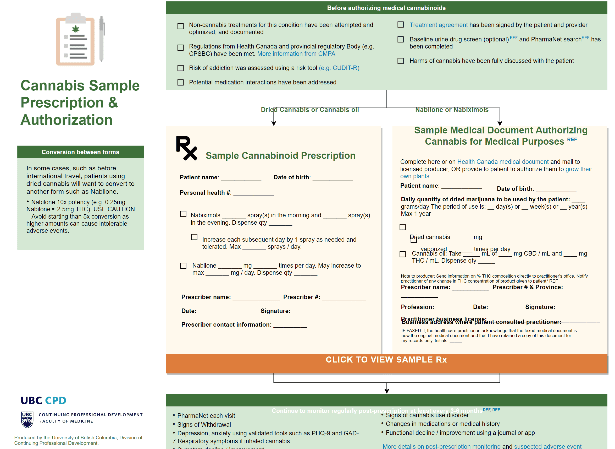In this article, we’ll be discussing whether doctors in Canada are able to prescribe cannabis. We’ll explore the legal framework surrounding the use of medical cannabis in Canada and the role of healthcare professionals in prescribing it. By the end, you’ll have a clearer understanding of the regulations governing medical cannabis prescriptions in Canada. So, let’s dive right in and explore this interesting topic together!

This image is property of med-fom-tcmp.sites.olt.ubc.ca.
Overview of Medical Cannabis in Canada
Medical cannabis has been legalized in Canada since 2001, providing patients with a viable treatment option for various conditions. The legalization of medical cannabis has brought about significant changes in the healthcare system, allowing doctors to prescribe cannabis as part of their therapeutic arsenal. In this article, I will delve into the regulations surrounding the prescription of medical cannabis, the qualifications and training required for doctors to prescribe it, the process of prescribing, the conditions that can be treated with medical cannabis, patient access to it, patient responsibilities and regulations, the potential benefits and risks of medical cannabis, the public perception and stigma surrounding it, as well as ongoing research and future developments in this field.
Legalization of Medical Cannabis in Canada
In 2001, Canada became one of the first countries to legalize medical cannabis, allowing patients with qualifying conditions to access it legally. This monumental step ensured that patients had a safe and regulated source for their medical needs, while also opening doors for further research and development in the field of cannabis-based medicine.
Regulations for Prescribing Medical Cannabis
The prescription of medical cannabis in Canada is governed by strict regulations set forth by Health Canada. Doctors are required to follow these regulations to ensure the safety and well-being of their patients. These regulations include the need to possess a valid medical degree and license, continuing medical education on medical cannabis, and a thorough understanding of the various strains of cannabis and their therapeutic applications.
Role of Doctors in Prescribing Cannabis
As doctors, we play a crucial role in the prescription of medical cannabis. Our primary responsibility is to provide appropriate care and treatment to our patients. With medical cannabis, we have an additional tool in our toolkit that can be used to effectively manage a wide range of conditions. However, it is important to note that medical cannabis is not a one-size-fits-all solution, and it requires careful assessment and consideration before prescribing it to a patient.
Qualifications and Training for Doctors
Medical Degree and Licensing
To prescribe medical cannabis in Canada, doctors must possess a valid medical degree and be licensed to practice medicine. This ensures that doctors have the necessary medical knowledge and expertise to understand the potential benefits and risks associated with prescribing cannabis as a treatment option.
Continuing Medical Education on Medical Cannabis
In order to stay up-to-date with the latest research and developments in the field of medical cannabis, doctors are required to undergo continuing medical education (CME) on this topic. This ensures that doctors are well-informed and equipped with the necessary knowledge and skills to make educated decisions regarding the prescription of medical cannabis.
Knowledge of Cannabis Strains and Their Therapeutic Applications
Doctors prescribing medical cannabis must also be knowledgeable about the various strains of cannabis and their therapeutic applications. Different strains of cannabis contain varying levels of cannabinoids, such as THC and CBD, which have different effects on the body. Understanding the specific properties and therapeutic benefits of each strain is crucial in determining the most appropriate treatment plan for each patient.
Process of Prescribing Medical Cannabis
Patient Assessment and Diagnosis
Before prescribing medical cannabis, doctors must conduct a thorough assessment of the patient’s medical history, current condition, and treatment goals. This includes obtaining a detailed patient history, conducting a physical examination, ordering necessary laboratory tests, and consulting with other healthcare professionals if needed. This comprehensive assessment helps doctors determine whether medical cannabis is a suitable treatment option for the patient.
Determining Appropriate Cannabis Treatment Plans
Once the patient has been assessed and diagnosed, doctors can then determine the appropriate cannabis treatment plan. This involves selecting the most suitable strain of cannabis, determining the optimal dosage, and considering any potential drug interactions or contraindications. It is important to note that medical cannabis treatment plans are highly individualized and may need to be adjusted over time based on the patient’s response and changing needs.
Ensuring Patient Safety and Monitoring
Doctors have a responsibility to ensure the safety of their patients when prescribing medical cannabis. This includes educating patients about the potential risks and side effects associated with cannabis use, as well as providing guidance on safe and responsible usage. Regular monitoring of patients is also essential to evaluate the effectiveness of the treatment, identify any adverse effects, and make any necessary adjustments to the treatment plan.
Conditions That Can Be Treated with Medical Cannabis
Chronic Pain Management
One of the most common conditions for which medical cannabis is prescribed is chronic pain management. Cannabis has been shown to have analgesic properties and can help alleviate pain in patients with conditions such as arthritis, fibromyalgia, and neuropathy. By targeting the body’s endocannabinoid system, cannabis can reduce inflammation and provide relief from chronic pain.
Cancer-Related Symptoms
Medical cannabis is also frequently used to manage cancer-related symptoms such as pain, nausea, and loss of appetite. Chemotherapy-induced nausea and vomiting can be debilitating for cancer patients, and cannabis has been shown to be an effective antiemetic. Additionally, cannabis can help stimulate the appetite, which is often suppressed during cancer treatment.
Multiple Sclerosis and Other Neurological Disorders
Patients with multiple sclerosis (MS) and other neurological disorders can benefit from the use of medical cannabis. MS is characterized by muscle stiffness, spasticity, and pain, and cannabis has been shown to help reduce these symptoms. Furthermore, cannabis can also have neuroprotective properties, potentially slowing down the progression of certain neurodegenerative diseases.
Patient Access to Medical Cannabis
Medical Cannabis Prescription Process
In order to legally access medical cannabis in Canada, patients must have a prescription from a doctor. The prescription must specify the daily dosage and duration of treatment. Patients can obtain their prescriptions from their primary care doctors, specialists, or in some cases, dedicated cannabis clinics.
Accessing Medical Cannabis from Licensed Producers
Once a patient has a valid medical cannabis prescription, they can obtain their medication from licensed producers. These licensed producers are regulated by Health Canada and are responsible for cultivating, processing, and distributing medical cannabis products. Patients can choose from a wide range of cannabis products, including dried flower, oils, capsules, and edibles.
Cannabis Distribution Channels
Medical cannabis can be obtained through various distribution channels, including online ordering, mail delivery, and in-person visits to licensed cannabis dispensaries. Patients have the option to choose the distribution method that is most convenient for them, ensuring easy access to their medication.
Patient Responsibilities and Regulations
Complying with Dosage and Usage Instructions
Patients who are prescribed medical cannabis have a responsibility to comply with the dosage and usage instructions provided by their doctors. It is important to follow the prescribed dosage and to use the medication as directed. Deviating from the prescribed dosage or using the medication in an unauthorized manner can have adverse effects on the patient’s health.
Adhering to Legal and Safety Guidelines
Patients must also adhere to legal and safety guidelines when using medical cannabis. This includes following the regulations set forth by Health Canada, such as not sharing their medication with others, storing their medication securely, and not operating machinery or driving under the influence of cannabis.
Reporting Any Adverse Effects
Patients should report any adverse effects or unexpected symptoms to their doctors immediately. It is important to communicate openly and honestly with healthcare providers to ensure the best possible care and treatment outcomes. By reporting any adverse effects, doctors can assess and address any potential issues in a timely manner.

This image is property of www.getmaple.ca.
Potential Benefits and Risks of Medical Cannabis
Efficacy in Symptom Relief
Medical cannabis has been shown to be effective in relieving symptoms associated with a wide range of conditions. From chronic pain management to cancer-related symptoms, cannabis has the potential to significantly improve the quality of life for many patients. By targeting the body’s endocannabinoid system, cannabis can provide relief where other treatments have failed.
Potential Side Effects and Drug Interactions
Like any medication, medical cannabis can have potential side effects and drug interactions. Common side effects include dizziness, dry mouth, and sedation. Patients should be aware of these potential side effects and discuss them with their doctors. Additionally, medical cannabis may interact with certain medications, so it is important to disclose all current medications to healthcare providers to avoid any potential adverse effects or interactions.
Monitoring Long-Term Health Impacts
As medical cannabis use becomes more widespread, ongoing research is being conducted to explore its long-term health impacts. It is important for doctors and patients to stay informed about the latest research and developments in this field. This will ensure that both healthcare providers and patients have a comprehensive understanding of the potential benefits and risks associated with medical cannabis use.
Public Perception and Stigma
Changing Attitudes Towards Medical Cannabis
The perception of medical cannabis has evolved significantly in recent years. Previously stigmatized, medical cannabis is now increasingly recognized as a legitimate treatment option by healthcare professionals and the general public alike. This shift in attitude has been fueled by growing scientific evidence supporting the therapeutic benefits of cannabis, as well as increased education and awareness about its potential.
Promoting Education and Awareness
Education and awareness play a crucial role in challenging misconceptions and dispelling stereotypes surrounding medical cannabis. By educating the public about the scientific evidence supporting its use and providing accurate information about its benefits and risks, we can help destigmatize medical cannabis and promote informed decision-making among patients and healthcare providers.
Addressing Misconceptions and Stereotypes
There are still misconceptions and stereotypes surrounding medical cannabis. Some people may still associate cannabis use with recreational drug use or may question its legitimacy as a medical treatment. As healthcare professionals, it is important for us to address these misconceptions and stereotypes, emphasizing the scientific evidence and clinical experience that supports the use of medical cannabis.
This image is property of i.cbc.ca.
Research and Future Developments
Current Clinical Studies on Medical Cannabis
Ongoing research is crucial in order to further understand the therapeutic potential of medical cannabis and to explore new treatment options. Numerous clinical studies are currently underway, investigating the efficacy of cannabis in treating various conditions, as well as the potential side effects and long-term health impacts. This research will help advance our understanding of medical cannabis and contribute to its continuous evolution as a treatment option.
Advancements in Cannabis-Based Medicine
In addition to the traditional methods of consuming cannabis, such as smoking or vaporizing, advancements in cannabis-based medicine are continuously being explored. This includes the development of new delivery methods, such as transdermal patches and inhalers, as well as the extraction of specific cannabinoids for targeted treatment options. These advancements have the potential to further enhance the efficacy and safety of medical cannabis.
Exploring More Treatment Options
As our understanding of cannabis and its therapeutic potential continues to grow, we can expect to see the exploration of new treatment options. This includes investigating the potential use of cannabis in the treatment of conditions that are currently not covered under the existing regulations, as well as exploring the synergistic effects of combining cannabis with other medications or therapies. The possibilities for utilizing cannabis as a treatment option are vast and exciting.
Conclusion
In conclusion, doctors in Canada can indeed prescribe cannabis as a treatment option for various conditions. With the legalization of medical cannabis, doctors are armed with an additional tool in their therapeutic arsenal to help alleviate the suffering of their patients. By adhering to the regulations set forth by Health Canada, ensuring proper qualifications and training, and following the prescribed process of assessment, diagnosis, and treatment, doctors can confidently prescribe medical cannabis. As public perception and awareness continue to evolve, collaboration between doctors and patients is crucial to ensure optimal care and treatment outcomes. The continuous research and development in this field hold promise for the future, providing even more treatment options and potential benefits for patients in need.

This image is property of i.cbc.ca.
Recent Posts
Discover how bubble hash is rated on a 1 to 6 scale. From texture and color to aroma and potency, learn the key factors that determine the quality of bubble hash. Whether you're a seasoned cannabis...
Looking to learn about the most popular style of hash? This article explores the different types, from traditional to bubble hash, and reveals the people's favorite. Join us on a journey through the...

